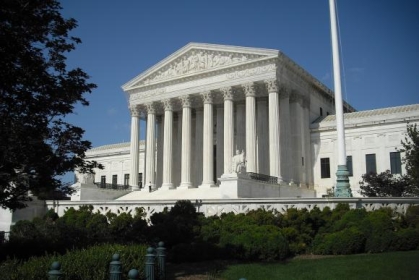Legal Issues to Watch in 2024

The U.S. Supreme Court has recently made pivotal decisions carrying profound short- and long-term implications and changing the landscape of American law. Rutgers Law professors in Camden and Newark take a look at the most pressing legal issues in 2024. (This article has been updated with 2024 decisions.)
Social Media

Social media plays a large and increasingly important role, sparking debates about misinformation, disinformation, and mal-information spread on social media sites and concerns about “censorship” keeping unpopular views off social media platforms. The Supreme Court will likely resolve five cases at the intersection of these issues. Murthy v. Missouri is a suit challenging social media content moderation efforts in response to Biden Administration jawboning to get social media to combat misinformation, disinformation, and mal-information on their platforms. The plaintiffs seek to attribute the social media moderation efforts to the government such that First Amendment constraints would apply to social media companies’ moderation decisions that keep them off their platforms. A duo of cases, Net Choice v. Paxton and Moody v. Paxton, involve First Amendment challenges to Florida and Texas laws designed to prohibit social media companies from “censoring” conservative voices as a part of their content moderation policies. Can states require social media companies to evenhandedly moderate content on their sites? The issue has significant implications for social media companies’ power to engage in content moderation free of state government constraint. A second pair of cases, Lindke v. Freed and O’Connor-Ratcliff v. Garnier, involve public officials’ ability to block critics from their social media accounts. Public officials frequently use personal social media accounts to interact with constituents regarding public issues, matters of public interest, or activities of the government. The lines are murky as to when officials’ accounts are required, by virtue of First Amendment doctrine, to make access to such social media sites available to the public and when, on the other hand, they can block unwanted persons free from First Amendment restraint. In short, expect the U.S. Supreme Court to make major foundational decisions regarding social media in the upcoming year.
June 28, 2024 Murthy v. Missouri decision: Reversed and remanded. Respondents lack Article III standing to seek an injunction.
July 1, 2024 Net Choice v. Paxton and Moody v. Paxton decision: Vacated and remanded because neither the U.S. Courts of Appeals for the 11th Circuit nor the 5th Circuit conducted a proper analysis of the facial First Amendment challenges to the Florida and Texas laws regulating large internet platforms
March 15, 2024 Lindke v. Freed and O’Connor-Ratcliff v. Garnier: Vacated and remanded
Administrative Law

The Supreme Court’s administrative law cases are increasingly formalist; a majority of the Court is interested in drawing bright lines around the federal government’s legislative, executive, and judicial powers. But important features of the modern administrative state—including agency adjudications of wrongdoing—can seem to intermix these powers. In SEC v. Jarkesy, the Court will confront this tension and potentially limit the power of federal agencies to adjudicate wrongdoing and impose civil penalties through proceedings before in-house administrative law judges rather than in a federal court with a jury. The case implicates important questions about the scope of Congress’s power to authorize a choice between agency and court adjudication; the extent to which agency adjudicators can be insulated from political appointee oversight; and when imposition of civil penalties requires an act of judicial—not executive—power. A ruling adverse to the government could require significant changes to how agencies across the administrative state enforce their rules and regulations going forward.
June 27, 2024 SEC v. Jarkesy decision: Affirmed and remanded. When the Securities and Exchange Commission seeks civil penalties against a defendant for securities fraud, the Seventh Amendment entitles the defendant to a jury trial.
Equal Protection Rights

Across the country, dozens of cases are pending that raise the issue of what Equal Protection rights the transgender community is entitled to (an issue that the Supreme Court has not yet taken up.) These cases have resulted in multiple circuit splits, and a number of petitions for certiorari review are now pending at the Supreme Court. Among the issues most likely to trigger Supreme Court review are a set of disputes about whether states can ban gender-affirming care for transgender youth (e.g., hormone therapy and puberty blockers.) While all major medical organizations in the United States support access to such care as medically necessary in some circumstances, 23 states have now fully banned access to such care for youth under the age of 18. Until recently, preliminary legal challenges to such laws were universally successful, with numerous judges, appointed by Presidents of both political parties, concluding that the stated reasons for such laws (health and safety of transgender minors) were unlikely to withstand meaningful factual inquiry (and indeed that such laws were likely to result in perverse health and safety effects.) But two circuits have now declined to apply heightened review, and have concluded that under a very deferential form of review, ordinarily reserved for routine economic legislation, that such laws are “rational.” These opinions contradict both the universal consensus of the medical establishment that withholding care from transgender youth can have profoundly adverse effects, as well as numerous well-established principles of modern constitutional law. Petitions for certiorari review, supported by the Solicitor General of the United States, have been filed in L.W./United States v. Skrmetti and Jane Doe v. Commonwealth of Kentucky.
Criminal Law

The Double Jeopardy Clause protects a defendant from being retried after an acquittal. Although the Clause has been chipped away at in many respects over the years, the idea that the government doesn’t get a second bite at the apple after an acquittal has been the unwavering center of Double Jeopardy jurisprudence throughout American history. In McElrath v. Georgia, which recently came before the Supreme Court, the defendant was acquitted by reason of insanity on the most serious charge but was found guilty on other charges at trial. The Georgia Supreme Court deemed the outcome of McElrath’s trial a “repugnant verdict” that had to be overturned. The question that arises in McElrath is whether the defendant can be retried on the charge of which he was acquitted. Although the Supreme Court has not shown much love for the insanity defense in recent years (see, for instance, Kahler v. Kansas, which held that states are not constitutionally required to provide a formal insanity defense), it seems unlikely that the Court would rule that an acquittal by insanity, even one seemingly in conflict with conviction on other charges, should not be respected as an acquittal for Double Jeopardy purposes. But if Court does find that McElrath can be retried on all charges, it would be a seismic change to the jurisprudence in this area.
Reproductive Rights

Kim Mutcherson
Despite the Supreme Court’s stated desire to return the issue of abortion to the states, cases related to abortion access will continue to come before the Court for years to come, especially around issues related to conflicts between states and conflicts between states and the federal government. First, the Court will be faced with deciding whether state laws banning abortion can trump federal law that requires that patients receive stabilizing care during medical emergencies as required by EMTALA. Typically, federal law supersedes state law, so the implications of the case go beyond abortion. Similarly, in the medication abortion case, the Court must decide whether to uphold the FDA’s decades long approval of mifepristone, one of two medications used in medication abortion. In general, agency determinations of this sort are subject to some amount of deference from the Court given agency expertise, but a decision in this case that doesn’t support the FDA could have far reaching implications for many other federal agency actions.
Mass Torts

Faculty Research and Development David Noll
This December, the Supreme Court heard argument in Harrington v. Purdue Pharma L.P. The case raises a technical question about the Bankruptcy Code: When can a bankruptcy court block claims against a "nondebtor third party"--someone who hasn't themselves entered bankruptcy--as part of a bankruptcy reorganization? Lurking beneath this technical question is a broader debate about how courts handle the fallout from mass harms. Purdue played a leading role in the opioids crisis, which has injured thousands of people and communities. When a company like Purdue decides to settle legal claims against it, can bankruptcy provide a way of binding the whole world to the settlement? Lawyers have tried to use bankruptcy this way in cases from the litigation over sexual abuse in the Catholic church to the 3M earplugs lawsuits to cases over the presence of asbestos in Johnson & Johnson talcum powder. The Supreme Court's decision in Harrington will have important implications for the viability of the bankruptcy strategy. If the Court rules in favor of Purdue and allows non-debtor releases, the attractiveness of bankruptcy as a form for resolving mass torts will skyrocket.
June 27, 2024 Harrington v. Purdue Pharma L.P. decision: Reversed and remanded. The bankruptcy code does not authorize a release and injunction that, as part of a plan of reorganization under Chapter 11, effectively seek to discharge claims against a nondebtor without the consent of affected claimants.
Housing

With housing costs skyrocketing and the number of unhoused Americans growing, the Supreme Court this January agreed to hear arguments in Johnson v. Grants Pass. This is a class action challenging as unconstitutional the anti-camping regulations of Grants Pass, Oregon, which impose penalties on people sleeping outside with a pillow, blanket, or other bedding. The Ninth Circuit Court of Appeals ruled that this violates the Eighth Amendment’s prohibition on Cruel or Unusual Punishment. The appeals court relied on both a previous Ninth Circuit decision, Martin v. City of Boise, and earlier U.S. Supreme Court precent holding that governments may not prosecute people for conduct that is involuntary or the product of a status. Martin had held that sleeping is involuntary for human beings, and if a city does not provide enough shelters for its unhoused population, sleeping outside is not a choice. The City of Grants Pass argues that it does not prohibit the involuntary act of sleeping, only the voluntary act of using bedding. The logic of that distinction aside, this is a case that has many housing advocates anxious about what the Supreme Court will do.
June 28, 2024 Johnson v. Grants Pass decision: Reversed and remanded. The enforcement of generally applicable laws regulating camping on public property does not constitute “cruel and unusual punishment” prohibited by the Eighth Amendment.